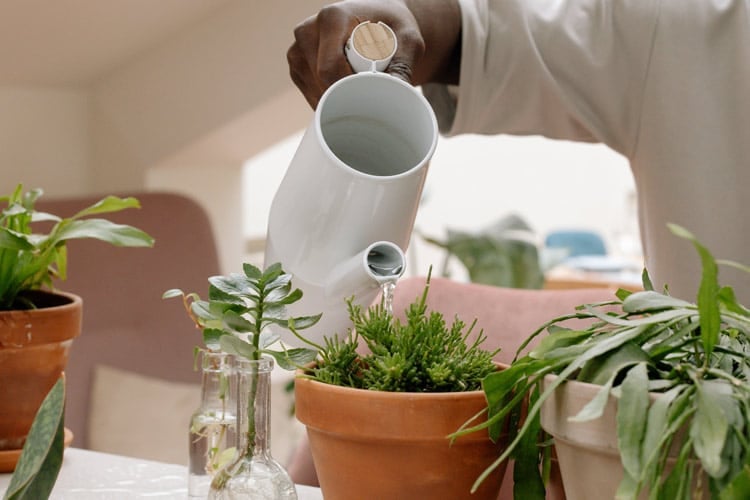When autumn arrives, you may look at your container and bedding annuals and wonder if there’s any way to keep them alive over the winter. You may be in luck; with a few easy garden hacks many plants that we grow as annuals can actually be kept alive to bloom another year!
What are Annual Plants?
There are 2 types of annuals; true annuals that germinate, grow, flower, and set seed all in a single season. Their lifespan is predetermined and regardless of the climate, they will die when they have completed their life cycle.
However, we often refer to tender perennials as annuals as well. In mild climates they can survive to bloom for several years, and you may be able to overwinter them in cold regions as well.
Can You Overwinter Annuals?
Depending on the species, some plants we refer to as annuals can be overwintered, but true annuals cannot be overwintered.
What Causes Annuals to Die?
True annuals die when they have completed their life cycle and set seeds. While you can sometimes prolong their blooming period by deadheading them to prevent them going to seed, they will still die by the end of the season.
However, many plants we grow as annuals are actually tender perennials that are killed by freezing temperatures.
How to Keep Annuals Alive Through Winter?
If you have plants that you think that you can overwinter successfully (see the list that follows this section), you should start preparing them in early autumn by digging them up and potting them in fresh potting soil.
Cut back the stems by about one-third. Water them well and leave them outside for a couple of weeks to recover from the stress of repotting. If frost threatens, bring them for the night.
Once cold weather is in the near future, bring your potted annuals inside. Place either in front of a sunny window, or on a plant stand with grow lights.
Keep them watered but fertilize infrequently, as the plants should get a bit of a rest from active growth through the winter months. Most plants need a dormant period to recharge.
In late winter, start to fertilize the plants once every few weeks.
Once temperatures are reliably above freezing, move the pots out to a shady spot, and slowly acclimate your over-wintered annuals to outdoor light levels. Too abrupt a switch to full sun will burn their leaves and set back their growth.
After the last frost date, plant out your annuals in containers or garden beds, and prepare to enjoy another season of their lovely flowers!
What Annuals Can You Overwinter?
There are many flower and vegetable plants that we consider annuals, but are in fact able to live for more than one season when protected from freezing temperatures. These are just some of them!
- Sweet Basil
- Begonia
- Chrysanthemum
- Coleus
- Dahlia
- Gerbera Daisy
- Dusty Miller
- Nicotiana
- Four o’clock
- Fuchsia
- Geranium
- Impatiens
- Pepper
- Petunia
- Flowering Sage
- Snapdragon
- Sweet Alyssum
- Sweet Potato Vine
- Verbena
What Annuals Can’t You Overwinter?
The following annuals cannot be overwintered, as they die once they have set seed. However, if you collect seeds from these plants, you may be able to start your own plants next year!
- Amaranth
- Bachelor’s buttons
- Bells of Ireland
- Calendula
- Candytuft
- Cornflower
- Cosmos
- Indian blanket
- Larkspur
- Marigold
- Morning glory
- Portulaca
- Phlox, annual
- California Poppy
- Shirley Poppy
- Snow-on-the-mountain
- Spider flower
- Sweet pea
- Zinnia
Can You Keep an Annual Plant Alive Inside Your House?
You can keep an annual plant alive inside your house by watering it regularly and giving it enough light, either in a sunny window or on a plant stand. Some annuals may also benefit from regular misting to increase the humidity level.
Will Annual Plants Survive in an Unheated Garage?
You may find that you don’t have enough windowsill or plant stand space for all of the annuals that you want to overwinter. In that case, you can separate your annuals into a couple of sub-groups: those that can be kept in a dark, cool environment during the winter, and those that do best with continual heat and light.
If you have a cold cellar that always stays above freezing, that’s a great place to keep plants like geraniums, salvia, and begonias. An unheated garage will work as well, but try to keep them in the warmest part. Don’t place them directly on the concrete floor, either, as that will get very cold.
Can You Keep Annuals Alive in a Greenhouse?
Even an unheated solar greenhouse can help keep annuals alive through the winter. Annuals that can survive a mild winter, such as snapdragons and some sages, will benefit from the extra protection in a greenhouse through the cold weather.
Just make sure to vent it on sunny days, no matter how cold it is outside, so the plants don’t put out new growth that will get nipped back on cold nights.
Can You Overwinter Annuals with Cuttings?
If you’re short on indoor space but want to have lots of plants for the following spring, you can try taking cuttings instead of potting up whole plants. In late summer, snip off stems right below a node, and stick the cuttings in water or a loose soil mixture. Water them well and cover them with a plastic bag to increase humidity levels.
Once they’ve rooted, plant them out in small pots. By next spring, you will have strong, healthy plants ready to go!
Geraniums, fuschias, petunias and impatiens are all excellent candidates for propagating with cuttings.
Final Thoughts
While many annual plants can’t be saved for a second year, bringing in your favourite plants is a great way to save money next spring, as you will be able to simply bring your overwintered plants back outside to enjoy for another growing season.
Whether you keep them flowering under lights or in a sunny window, let them go dormant in your garage, or take cuttings to propagate new plants for next spring, almost anyone with a garden or container plants can find a way to overwinter annuals.

Jamie is the founder of The Backyard Pros. When he was 15 years old he started working at a garden centre helping people buy plants, gardening products, and lawn care products. He has real estate experience and he is a home owner. Jamie loves backyard projects, refinishing furniture, and enjoys sharing his knowledge online.




